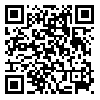Volume 3, Issue 3 (August 2016)
Avicenna J Neuro Psycho Physiology 2016, 3(3): 66-72 |
Back to browse issues page
1- Assistant Professor of Payame Noor University, Kabudarahang, Iran
2- Lecturer of Payame Noor University, Kabudarahang, Iran ;Researcher, Young Researchers and Elite Club, Islamic Azad University, Hamadan, Iran , raheleh_moein@yahoo.com
3- Assistant Professor of Medical Sciences University, Hamadan, Iran ; Behavioral Disorders and Substances Abuse Research Center, Hamadan University of Medical Sciences , Hamadan, Iran
2- Lecturer of Payame Noor University, Kabudarahang, Iran ;Researcher, Young Researchers and Elite Club, Islamic Azad University, Hamadan, Iran , raheleh_moein@yahoo.com
3- Assistant Professor of Medical Sciences University, Hamadan, Iran ; Behavioral Disorders and Substances Abuse Research Center, Hamadan University of Medical Sciences , Hamadan, Iran
Abstract: (1762 Views)
The increase of dissatisfaction in marriage and its adverse effects on physical and mental health of couples and children make it necessary to improve marital interaction and implement enrichment programs. This research aimed to investigate the effectiveness of PIMQ (Promoting Iranians’ Marital Quality) training program in marital quality. A researcher-made program called PIMQ designed based on cultural beliefs, value system, religious orientation, literacy level, and social character of couples was used in this research. This program was implemented on 30 couples who were randomly placed in two experimental and control groups. The marital quality scale was administered to each group before educational sessions. The PIMQ program was implemented for the experimental group in eight sessions of one hour while the second group received no intervention. The sessions were held once a week. Immediately after the completion of educational sessions, the marital quality scale was applied on both groups. A month after the completion of sessions, the follow-up was performed. The results of covariance analysis showed that PIMQ training program could increase marital quality in the experimental group and the increase remained significant at one month follow-up. Based on the research hypotheses, PIMQ training program increased marital quality in the posttest and follow-up.
Article Type: Research Article |
Subject:
Special
Received: 2016/07/24 | Accepted: 2016/08/12 | Published: 2016/08/27
Received: 2016/07/24 | Accepted: 2016/08/12 | Published: 2016/08/27
| Rights and permissions | |
 |
This work is licensed under a Creative Commons Attribution-NonCommercial 4.0 International License. |



